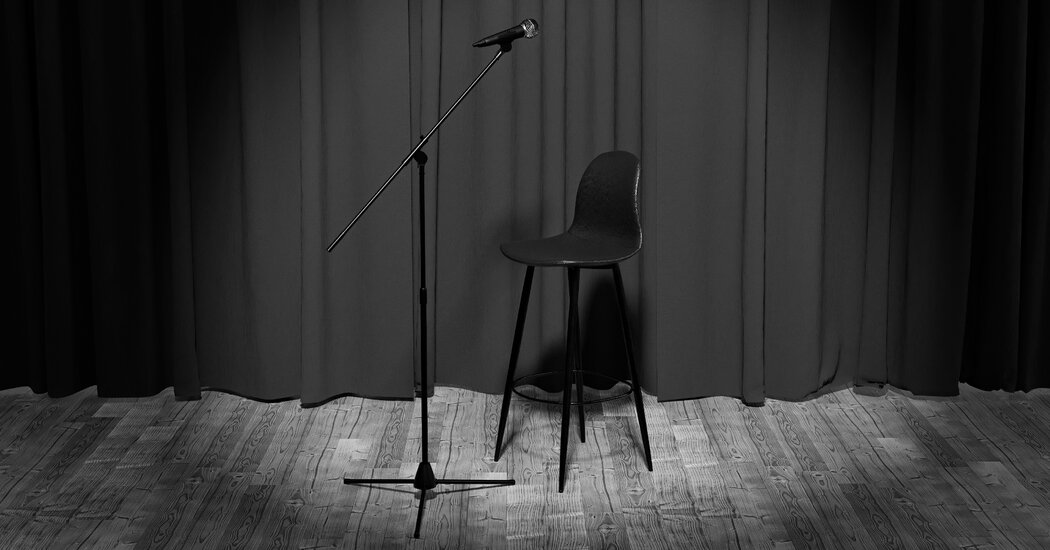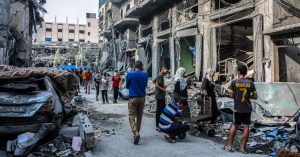
“We’re not allowed to grieve because of the war in Israel” said a Palestinian American
Israel’s complete siege of Gaza: The number of Palestinians killed and the humanitarian status of the Gazan population is far too large, according to Human Rights Defenders
Fighting outside Gaza has also escalated. Over the weekend, several Israeli towns near the Israel-Lebanon border were evacuated amid rocket exchanges and gunfire with the Iranian-backed militant group, Hezbollah. Israel has also increased its airstrikes in the West Bank — a rarity prior to the current conflict — in an effort to fight off Hamas.
Hamas headquarters, tunnels and firing positions were the focus of the Israel Defence Force’s strikes on Sunday.
According to Gaza’s Ministry of Health, the Palestinian death toll has reached 5,087 since Oct. 7, the day Hamas unleashed the deadliest attacks on civilians since Israel’s founding in 1948. Israeli officials have said that over 1400 people were killed in the attack.
On Monday, Israeli Defense Forces raised the confirmed number of Hamas hostages to 222, saying the total now includes a number of foreign nationals who were not initially on the list.
The Israel Defense forces dropped fliers on Gaza in order to convince the Palestinians to contact them with information about the hostages.
At least 10 Americans remain unaccounted for, said Secretary of State Antony Blinken on Friday while briefing reporters about the release of two Americans who were being held hostage — Judith Raanan, 59, and Natalie Raanan, 17, a mother and daughter from Illinois.
On Saturday, 20 truckloads of aid were delivered while on Sunday 14 more truckloads were delivered. There was another shipment entered on Monday.
But humanitarian workers say the relief is not nearly enough. The U.N. states that the shipments amount to 3% of what would normally cross the border before hostilities began.
For two weeks Israel’s “complete siege” of Gaza has halted food, medical supplies and fuel from getting in. Power and water are still cut off. After waiting at the crossing, 20 trucks of aid were allowed into Gaza and another dozen were allowed to enter on Sunday, according to a UN official. The UN said that it was only a drop in the bucket for a besieged population of more than 2 million. More than 200 aid trucks are still waiting to cross. There is no way out for Palestinian civilians in Gaza.
With Gaza’s main power plant out of operation, fuel is also needed to power generators for critical infrastructure, including hospitals and desalination plants.
A shortage of fuel held by the U.N.’s Relief agency for Palestinians will be finished within a few days, officials warn.
Dr. Ghassan Abu Sitta, a British-Palestinian doctor working in Gaza, said that every medical specialty in Gaza has run out of supplies.
An estimated 14,000 wounded “have consumed all of the supplies in the system, from the medication to the equipment to everything you can imagine is required to care for such traumatic injuries and such critically ill patients,” he told NPR.
Security and Security Issues in the Middle East: a joint statement from the United States, France, Italy and the United Kingdom condemned by Western leaders on Sunday
Amid the worsening humanitarian crisis, a group of Western leaders issued a joint statement Sunday reiterating support for Israel’s “right to defend itself against terrorism” while also calling for the country to adhere to humanitarian law, including the protection of civilians.
The statement came after a phone call between President Biden, Prime Minister Justin Trudeau of Canada, President Emmanuel Macron of France, Chancellor Olaf Scholz of Germany, Prime Minister Giorgia Meloni of Italy, and Prime Minister Rishi Sunak of the United Kingdom.
The leaders committed to coordinating with partners in the region to ensure aid reached those in Gaza, as well as “close diplomatic coordination, including with key partners in the region, to prevent the conflict from spreading, preserve stability in the Middle East, and work toward a political solution and durable peace,” the statement reads.
The comments from Western leaders came after Biden held a call with Israeli Prime Minister Benjamin Netanyahu, during which the two agreed to a “continued flow” of aid into Gaza, the White House said.
Netanyahu has had many talks with world leaders in the last few days. Dutch Prime Minister Mark Rutte is visiting Israel today, while France’s Macron is scheduled to visit tomorrow.
China’s special envoy to the Middle East, Zhai Jun, is also in the region today. Russia’s foreign minister, Sergei Lavrov, is also planning to head to the Middle East, but will start with allies in Iran on Monday.
Thrall, Israel, and the War in Gaza: What Is Happening To Israel and How Is It Happened To Israel?
I cringe to think of the catastrophe in Israel and Gaza happening through America’s cancellation culture debate. In some ways, that debate has now come full circle, because pro-Palestinian voices were being censored long before the phrase “cancel culture” existed, one reason the left was unwise in recent years to prevaricate about the value of free speech. We are in an especially repressive time if someone like Thrall finds his talks being dropped. And in a time of war, particularly a war shrouded in fiercely competing narratives, free speech is more important than ever.
“I was very glad to be asked that question,” Thrall told me. “Because that was absolutely the ambition of the book, to depict real people” rather than villains and saints.
“How does one promote a program on this subject to a largely Jewish audience when people on all sides are being bombed, killed and buried?” Andrea Grossman, whose Los Angeles nonprofit called off an event with Thrall, said in The Guardian. ads for the book were pulled by American Public Media. “We aim to avoid any perception of endorsing a specific perspective,” an APM spokesman said in an email, insisting that airing sponsorship spots for Thrall’s book would be “insensitive in light of the human tragedies unfolding.”
I don’t like the fact that the statement Nguyen signed gestured only vaguely at Hamas’s slaughter of Israeli civilians. The Jewish organization 92NY played a game of rules, privileging sensitivity to the communities they talked to and calling off his appearance on Friday. Zionists feel intimidated and silenced on college campuses because of the censorious atmosphere created by supporters of Israel. A professor at the University of California, Davis, is facing investigation by the university for a social media post calling for the targeting of “Zionist journalists,” which said, “They have houses with addresses, kids in school,” and included emojis of a knife, an ax and three drops of blood.
Nevertheless, a commitment to free speech, like a commitment to human rights, shouldn’t depend on others reciprocating; such commitments are worth trying to maintain even in the face of unfairness. Art can keep our mind and hearts open and make us understand that we can’t be divided between the human and the inhuman at the same time.
92NY is a good place to ask him why he signed the statement if it didn’t live up to his words. The moments when dialogue is most fraught and bitter is when leaders most need to model it.
“There can be no cease-fire, negotiated solution or peaceful coexistence with depraved barbarians who murder teen-aged girls, children & the elderly,” said Sen. Marco Rubio (R-FL) on X, formerly known as Twitter, advocating for Israel to respond “disproportionately.”
“If you want to know how antisemitic some Palestinians are, look at how they behave, not all of them are Hamas but they are all Antisemitic,” said the candidate in Iowa. “None of them believe in Israel’s right to exist,” he said.
The people were beating the drum of war on social media. Sometimes they were people he knew. Many decent people froth at the mouth and say that they want to burn Gaza to the ground.
A video on social media was shared by a colleague in Gaza and when NPR spoke with him, he had just seen it. It showed all the body bags of his friend’s dead family members.
Mustafa says she’s also hearing from folks who have been fired or doxxed. She’s hearing from parents that their children’s school sent notes of support for Israel and Israeli victims, but failed to acknowledge the lost lives of Palestinians.
“I barely have time to engage in the act of living,” he says. From his home in Detroit, he’s observing his family’s home of Gaza being destroyed.
NPR spoke to a dozen Palestinians in the United States, who said they were mourning Gaza while feeling abandoned by their country. On top of that, they fear rising anti-Palestinian sentiment and Islamophobia.
Luthun does data engineering by day. By night he’s a poet and a community organizer. He’s done mostly disability justice work, but since the war started, he’s been on calls and texts with other organizers to find a way to stop the bombing. He says around 75 percent of his family is in Gaza. So far, they’ve survived.
While watching my family get bombed I was being gaslit to say they deserve it. He hears Hamas being conflated with innocent Palestinians like his family, or that all Palestinians bear responsibility for Hamas’ attack on Israel.
Hamas controls Gaza, but there haven’t been elections since 2006. In Gaza, half of the population is children, meaning many of them weren’t old enough to vote.
The United Nations Relief and Works Agency (UNRWA), which is the main relief organization in Gaza, puts Hani in a position to know how things work. He lives in the D.C. area, but was visiting with his family, just a few weeks ago.
Almadhoun says some of his family went south, after Israel ordered 1 million Palestinians to leave Gaza City. The other members stayed together on the edge of northern Gaza because of the bombing of the south.
He says most of his family members are huddled together in an apartment building, staying away from windows during the day, sleeping under staircases at night, aware they could die at any moment.
The Case of the Nakba: Israel’s First Violation of the Palestinian Constitution and the First Day of World War II, Revisited
When Almadhoun finally got in touch with his mother a week into the bombing, she asked to do a video call so she could see his face, in case it’s the last time.
Over the weekend, his sister-in-law lost 12 members of her family in an airstrike on their home. All of her siblings are gone, and they can’t find her father in the rubble.
“I’m afraid for my family members to die in front of my eye. I’m afraid for the next day. I’m afraid for the night to come,” he said. The people of Gaza think they are dreaming and need someone to wake them up.
Empathy isn’t the only thing absent from the discourse, says Rania Mustafa, executive director of the Palestinian Community Center, an advocacy group in New Jersey. She says that many conversations here in the US are missing crucial context because people are picking up a book in the middle.
She says American politicians, media and culture are stuck in what she calls a false narrative that this latest siege began with Hamas’ attack – when decades of complicated history preceded this moment.
Over the last fifteen years, Israel has had a war or conflict with Gaza five times. But the history goes back even further she says, to what Palestinians call ‘the Nakba’ — or ‘catastrophe’ in Arabic – the mass displacement of 700,000 Palestinians during the establishment of Israel.
Israel has a land, sea and air blockade of the Gaza Strip for the past 16 years. Egypt has a blockade on its border with the enclave. Both countries say it’s necessary to protect against militants, though some humanitarian groups have called Gaza an “open-air prison.”
The United States has supported Israel for a long time. Some human Rights groups have called what happened to Palestinians in parts of the occupied territories apartheid, and the United States has continued to support that.
Lindsey Graham told Fox News to level the place. “Gaza is going to look like Tokyo and Berlin at the end of World War II when this is over. And if it doesn’t look that way, Israel made a mistake,” he said.
Yocheved Lifshitz, 19, was born in Gaza and is still fighting a Hamas kibbutz
On the day after she was released, Yocheved Lifashitz described her abduction as a nightmare we couldn’t have imagined.
Speaking from a wheelchair in Tel Aviv, Israel, where she is being treated, Lifshitz told her harrowing tale of being bound up, thrown over a motorcycle, beaten with a wooden pole, and her jewelry stolen as she was forced away from Nir Oz, the tiny kibbutz where she
Lifshitz and Nurit Cooper, 79, were released Monday after an agreement brokered by Egypt and Qatar. It was not clear why the two women were chosen for release or what Hamas received in return.
A video released Monday by Hamas showed the two women being greeted by the International Committee of the Red Cross, which transported them across Gaza’s Rafah border with Egypt. In the video, Lifshitz can be seen reaching back out to shake the hand of a Hamas fighter as she says “shalom,” the Hebrew word for “peace” that is used as a greeting and farewell.
Israeli military officials say that they still have their plans and are committed to eliminating Hamas’ military capabilities.
“We want to bring Hamas to the point of full dismantlement,” Israel Defense Forces Chief of Staff Lt. Gen. Herzi Halevi said in remarks Monday. There are tactical and strategic considerations that have provided additional time. And troops who have more time are better prepared, and that is what we are doing now.”
He told NPR in a voice memo that it is difficult to move his family since his elderly parents are in poor health.
Instead, he has stayed to see buildings in the area damaged and destroyed, including the apartment where he had been living for only one month as a newlywed with his new wife. The family’s food supply has dwindled to some rice and some canned food — not enough to last through tomorrow, he said.
Hamas in Gaza? Palestinians have a right. Israel can’t afford it, but Israel can take it seriously: The case of Sheikh Tamim bin Hamad Al Thani
Fifty-seven truckloads of aid — mostly food, water and medical supplies — have entered Gaza over the past three days, a “drop in the ocean,” according to the U.N. refugee agency.
Qatar, which has taken a lead in mediating negotiations between Israel, Hamas, the U.S. and other countries around the region, called Tuesday for an end to the war without embroiling others in the region into the conflict.
“We say to Israel: Enough is enough. It is not permissible to continue ignoring the reality of occupation, siege and settlement,” Qatar’s emir Sheikh Tamim bin Hamad Al Thani wrote on the social media site X.
“We refuse to attack civilians from any party, regardless of their nationality, and we refuse to act as if the lives of Palestinian children do not count, as if they have no faces or names,” he said.
Her account of the tunnels offered a glimpse of the difficulties facing Israel as it weighs whether and how to launch a ground invasion of Gaza to eliminate Hamas, which led the devastating Oct. 7 attack against Israel.
Military analysts said that Hamas built a labyrinth of underground passages for its fighters in the Gaza Strip, complicating any attempt to rescue the hostages.
Ms. Lifshitz said that she and other people were kidnapped, some of them they beat. They didn’t make a difference, abducting the elderly and young.
They took her through the network of tunnels until they reached a large hall where about 25 people were, she said. She told me that after about three hours, they separated five people from her kibbutz into their own room, where they were kept watch by guards and a medic.
She said that she and others were well taken care of and that they were just as well off as their captivity was. Fearing disease, her abductors worked to clean the area and doctors would come to check on her occasionally. “They treated us gently and fulfilled all of our needs,” she said.
Ms. Lifshitz at times criticized the Israeli military, saying that it and the Shin Bet domestic security service had ignored warning signs of the threat to towns near Gaza. The Israeli military’s chief of staff acknowledged after the attack that the military had failed to live up to its mission to protect Israel’s citizens.
Weeks before the assault, Palestinians had rioted and fired explosive balloons near the Gaza border fence, sparking fires in southern Israel, Ms. Lifshitz said.

